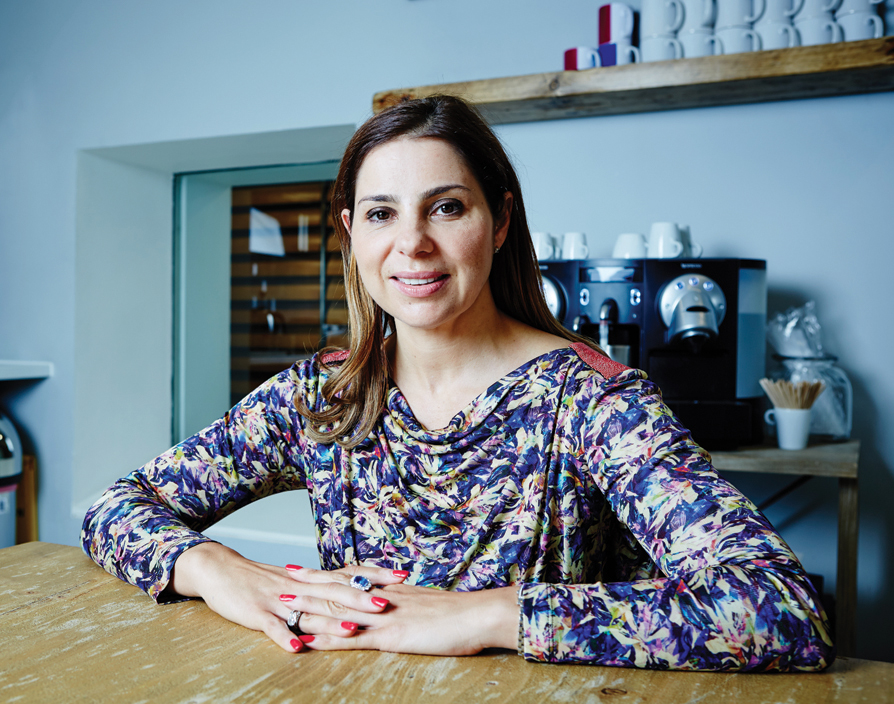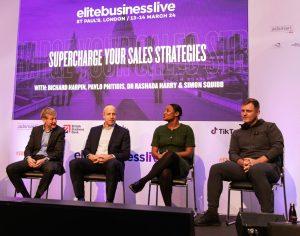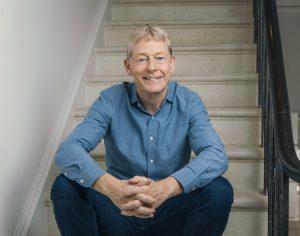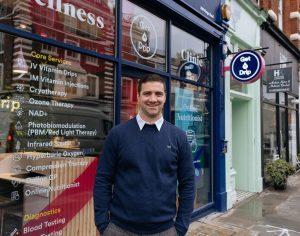Counting female tech stars like Sarah Wood and Martha Lane Fox amongst her close friends, it’s safe to say that being connected to a community of likeminded entrepreneurs has been important for Debbie Wosskow, the founder and CEO of Love Home Swap. Having built the home-swapping startup into a household name, she is now dedicated to ensuring that the next generation of female-led startups have an ecosystem of their own.
Certainly Wosskow hasn’t ever lacked for entrepreneurial inspiration. “I’ve always been surrounded by entrepreneurs,” she says. Her father was an Oxford-educated lawyer with his own firm, whilst her mother owned her own printing and packaging business. Seeing so many people imbued with the startup spirit certainly had an impact on the young Wosskow: by age 12 she had started working at her mother’s business and became the national winner of Young Enterprise at just 15 with a business that sold hair scrunchies. “Not only is entrepreneurialism very much in my DNA but being surrounded by people that have started their own businesses normalises it,” she says.
But Wosskow didn’t just get a taste for entrepreneurialism from her parents. “In my family, two things were really important: business and academic excellence,” she says. After leaving school, she followed in her father’s footsteps and secured a place at the University of Oxford studying philosophy and theology. As well as teaching her some incredibly valuable tools for her future career – such as being able to parse large quantities of information and present a confident and coherent argument – her time there also brought her into the social circles of future digital luminaries like Martha Lane Fox and Brent Hoberman. “Within tech, there’s an awful lot of Oxbridge graduates,” she says. “I’ve been very lucky to have that network, particularly when it comes to women.”
In 1995, entrepreneurialism wasn’t exactly a standard career path for an Oxford graduate, so after Wosskow completed her MA, she secured a position with the American management consultancy Oliver Wyman. “It was a real baptism of fire,” she recalls. “They graded you on how you were doing relative to your intake and I came bottom: I’d never been bottom at anything.” Despite this, for Wosskow it proved an invaluable experience: not only does she feel it’s important for entrepreneurs to learn how to overcome their limitations but her time working for the business also taught her a great deal about measuring performance and profitability. “If you’re going to be an entrepreneur, the sooner you can get that into your system the better,” she says.
After leaving Oliver Wyman, Wosskow briefly went to work for the Brunswick Group, at the time just a plucky startup with 50 employees, and this once again started her thinking about creating something of her own. “At that time, it was the middle of the dotcom boom and lots of people I knew were setting up their own businesses,” says Wosskow. “It felt like the gold rush.” Eager to stake her claim in this wild new frontier, she co-founded Mantra PR with Lawrence Dore and, whilst she admits they were perhaps a little naive at first, they quickly learned a great deal about how to sell, scale a business and deal with investors. “We didn’t know much to start with but I really grew up with that company,” she says.
Recognition of this fact came in 2001 when Wosskow was selected for the first ever Management Today 35 Women Under 35, something she felt definitely gave her a little extra punch when meeting with clients and investors. “When you are young and don’t have experience, independent markers of success and credibility are helpful,” she says. And Wosskow was in rarified company indeed: fellow entrepreneurs Michelle Mone, Martha Lane Fox and Stella McCartney were all also featured the same year. “It was an amazing group of people,” she says. “They’ve been doing it for fifteen years now and there’s been some fantastic people on that list.”
By 2007, Wosskow and Dore had decided it was time to move on from Mantra so they sold the business to the Loewy Group, the marketing services company. “For all sorts of financial reasons, it felt like the appropriate moment,” Wosskow explains. After a short time serving as an investor and holding several board positions, she plunged once more unto the breach when she founded Maidthorn Partners, an investment and advisory firm, with close friend and former EMAP board member Simon Walker. “Really it just started out as ‘let’s have some fun and invest some of the money that we’ve made in other people’s businesses’,” she says. The duo spent the next two years helping media and tech companies find their feet, something that Wosskow really relished. “It was a great time creatively and was really fun,” she says. “But the biggest thing for me was trying to find my next adventure.”

Ironically, it was thanks to a rather underwhelming adventure abroad in 2011 that inspiration struck: Wosskow took her young children to an expensive hotel in the Caribbean but spent much of the holiday eating room service in front of a muted TV while her infant daughter slept. On the flight home, she happened to watch The Holiday, a romcom in which Cameron Diaz and Kate Winslet swap homes. “I thought: ‘Does that exist? Because that’s the holiday I wish I’d just had’,” she says.
On her return, Wosskow began to think about how a platform that allowed holidaymakers to trade their homes would offer a more personal experience for all involved – and soon she found she couldn’t get the thought out of her head. “If an idea gives you goosebumps every time you think about it, then you know it’s a keeper,” she says. “That was how the the Love Home Swap story began.”
In Wosskow’s eyes, the best way to think about Love Home Swap is as online dating for homes: users set up profiles for their homes and their local areas and find people with whom they’d like to trade. “To a certain extent, what people are buying into is a life swap,” she says. “Of equal importance to the look of your home is your neighbourhood and the things that you do, whether that’s visiting your local farmers’ market or your favourite bar.” Perhaps its most innovative feature however is a relative recent addition: Love Home Swap now allows users to accrue points when people stay in their homes rather than doing a direct trade, for example enabling users to holiday in Cape Town yet share their own home with a Parisian. “That has been what has really driven our growth: 75% of all of our swaps are finalised using points,” Wosskow explains.
Given its focus on facilitating conversations between consumers, one of the first steps that Love Home Swap had to take was establishing a thriving community. Not only did the startup get a lot of mileage out of techniques like PPC and SEO but Wosskow also invested a great deal of effort telling her tale to new audiences. “It was just about spreading the story, talking about the business and people behind it,” she says. And once Love Home Swap had attracted consumers to use its service, it encouraged them to share their experiences with others. “When people home swap, they go out and tell other people that they’ve had this amazing holiday,” she says. “So we really invested in incentivising members to share what they’d done with other people.”
However, even once it began to build a community, it still needed to win over investors. “Five years ago, there was no real understanding of on-demand marketplaces or the sharing economy,” explains Wosskow. This meant securing venture capital for the business was far from straightforward: many VCs struggled to wrap their heads around why someone would risk inviting an unknown element into their homes. Fortunately, thanks to her experience as an entrepreneur, Wosskow was able to convince MMC Ventures to take a punt on the business and invest £850k in its seed round. “Having a track record and previous exits was very useful,” she says. “I was seen both as someone who could drive the business forward but also who would convincingly be able to spread its story.”
And MMC’s faith in the venture has since been vindicated, with the high-profile successes of startups like Airbnb and Uber driving greater public awareness of the sharing economy. “In my world, we see what we call the Airbnb afterglow,” Wosskow says. “It has normalised the very thing that investors said nobody would ever do.” Despite the fact that there are significant differences between the Silicon Valley home-rental startup and Love Home Swap, the former has helped to really cement the concept of the sharing economy in the public conscious. “My mother stayed in an Airbnb in the summer,” she says. “She’s a 70-year-old woman: the thought of her doing that five years ago would have been very unlikely.”
With the sharing economy taking off around the world, Wosskow didn’t constrain herself to just boosting her own business. Not only did she launch Collaborative Consumption Europe, a quarterly meetup and panel discussion for sharing economy startups, but in 2014 the UK government tasked her to produce an independent report into the sharing economy. “That was a huge piece of work,” she says. “It was very full-on.”
After ten weeks, Wosskow delivered a whole host of recommendations for ways in which the sector could be given a helping hand, including the creation of Sharing Economy UK, a new industry body she chairs that is designed to represent the sector. In Wosskow‘s eyes, it’s absolutely vital for a new industry having someone fighting its corner. “It really helps an emerging sector to have a spokesperson who can articulate key messages on behalf of the entire industry, particularly to political stakeholders,” she says. “Everything that I’ve done is to try and make the UK the global home of the sharing economy.”
But Wosskow believes that the sharing economy isn’t the only thing in need of a champion. “The statistics for female founders, women raising venture capital and female investors are all terrible,” she says. “And the only way that we are going to change that conversation is by doing something about it.” To this end, Wosskow has made it her mission to give female founders a leg up: she backed three female-led startups in 2015 alone. “Women in tech is one of my big passions,” she says. “And you have to put your money where your mouth is: you’ve got to pitch in and help out.”
In light of these efforts, it’s hardly surprising that Wosskow was included in Queen’s 90th birthday honours last month, receiving an OBE for services to business. “I was in amazing company this year: I felt really privileged to be on that list,” she beams. Not only was there a big showing for male entrepreneurs – Richard Reed, Eben Upton, Martin Dickie and James Watt all received honours – but there were also a great number of female tech entrepreneurs recognised, with Sarah Wood and Alex Depledge picking up an OBE and MBE respectively. “These are my proper girlfriends so it felt like a really good year for the girls,” she says.
And it’s also been a very good year for Wosskow herself, with Love Home Swap going from strength to strength. “The business had 250 homes on the site when it launched,” she says. “It now has almost 150,000.” Thanks to two strategic acquisitions – Home Exchange in 2013 and HomeForExhange in late 2015 – as well as the recent purchase of a stake in the business by Wyndham Hotels & Resorts, Love Home Swap has rapidly come to make serious inroads into Europe. And it has no intention of letting up: its targets are to at least double in size year-on-year. “Our growth has been enormous,” she says. “My strategy is to continue to grow the business organically but also to look at acquisitions where appropriate.”
Beyond Love Home Swap, Wosskow admits she still has a few itches she’d like to scratch. “We’ve learnt a lot over the last five years about how to grow a sharing economy marketplace,” she says. “There’s a lot of other things that we could do with that knowledge.” Additionally, she intends to dedicate more time to championing female entrepreneurs. “In the same way that I’ve been focusing on making the UK the home of the sharing economy, I’d like to make it the best place in the world to be a female entrepreneur,” she concludes. “That should keep me busy for the next few years.” ![]()
Share via:


















































